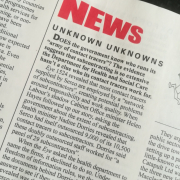Public Procurement in the Pandemic – Is it Who You Know, or What You Know?
Yesterday, The Times published a long article looking at how PPE (personal protective equipment) has been supplied to NHS hospitals and other locations during the pandemic. Unlike most articles on this topic, it presented a rosy picture – well, rosy at least once the Army and Clipper Logistics got involved. Indeed, it could not have been more positive about those two organisations if it had been written by their PR people.
Everything was great – everyone got all the PPE they needed, the famous eBay portal worked fine (it didn’t), and the Army plus Clipper rescued the incompetent NHS procurement system. It is a little surprising to see one part of the public sector dumping so publicly on another, but perhaps that is a foretaste of spending battles to come in the UK government through the recession, battles which the NHS is likely to win over the armed forces. Perhaps the military are getting their retaliation in first?
Anyway, the aspect of the article that grabbed my attention was the revelation that the choice of Clipper was made by Neil Ashworth, “a civilian working in the British Army’s Engineering and Logistics Staff Corps and a former supply chain director at Tesco”. It is not clear quite how and why Ashworth was involved with the Army but The Times says “It was then that the Ministry of Defence made contact with Mr Ashworth to get the ball rolling. He recommended Clipper, a fast-growing logistics group that specialises in online retail, to his MoD contacts and they told him to recruit the company”. Ashworth then called Tony Mannix, the boss of Clipper Logistics, and off they went.
I suspect Ashworth was also behind the choice of eBay for the PPE portal, based on comments made by Eb Mukhtar, the army reserve logistician who has been the public face (or at least the public name) behind this exercise up to now.
But how did Ashworth choose Clipper? Was there an analysis of alternative options? Is there any audit trail to support that decision? Did anyone ask whether Ashworth personally had any conflicts of interest here?
Now I’m not suggesting for a moment that the team should have taken 3 months to run a formal tendering exercise. Neither do I think that Clipper slipped Ashworth a brown envelope stuffed with currency – his cv is impressive and he clearly knows this area. But even in these “difficult times”, we need to be on our guard against fraud and corruption in its widest sense. And my definition of “corruption” includes corruption of the proper process.
So even when there is urgency, we need to know that public money is being protected. In this case, we need some transparency about exactly how these decisions were made, and what checks and balances were in place. The same applies to some of the rather odd looking contracts for PPE itself that are emerging.
In my new book, Bad Buying – How organisations waste billions through failures, frauds and f*ck-ups”, (to be published by Penguin Business in October), there are some amazing stories of fraud and corruption. But the sad fact is that it can spread quickly if there are opportunities or process weakness, as it did in the US Navy during the “Fat Leonard” affair. Or as it has in South African public procurement and through their government owned businesses, to the point where the country is close to being declared a “failed state”.
The reason it spreads like a virus is explained in my book – here is a key excerpt.
“Finally, this matters because it has wider effects beyond the organisations directly involved, as corruption can distort normal business and even social practices and priorities. For instance, if firms know that bribing government officials is the best way to win public contracts, a firm will focus its resources and efforts into doing that effectively. They will worry less about writing a good bid, developing better products or services or performing the work well.
The knock-on effect is that decent firms start thinking “what’s the point”? They either move over to the dark side and start on the bribery route, or withdraw from the market, customer or even country altogether. This can lead to a downward spiral, where supplier performance gets worse and worse, and corruption becomes endemic…”
You might think that we are somehow immune from that unhappy situation in the UK and other developed countries. We are not. If firms start thinking that “who you know” is more important in terms of winning government contracts than “what you can deliver”, then we will be on a very slippery slope. And that’s why we shouldn’t absolve those involved in public procurement during these “difficult times” from the need for process, propriety and transparency.










Leave a Reply
Want to join the discussion?Feel free to contribute!